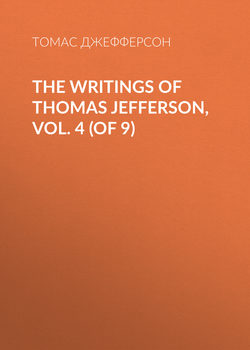Читать книгу The Writings of Thomas Jefferson, Vol. 4 (of 9) - Томас Джефферсон, Thomas Jefferson - Страница 59
TO M. D'IVERNOIS
ОглавлениеMonticello, February 6, 1795.
Dear Sir,—Your several favors on the affairs of Geneva found me here, in the month of December last. It is now more than a year that I have withdrawn myself from public affairs, which I never liked in my life, but was drawn into by emergencies which threatened our country with slavery, but ended in establishing it free. I have returned, with infinite appetite, to the enjoyment of my farm, my family and my books, and had determined to meddle in nothing beyond their limits. Your proposition, however, for transplanting the college of Geneva to my own county, was too analogous to all my attachments to science, and freedom, the first-born daughter of science, not to excite a lively interest in my mind, and the essays which were necessary to try its practicability. This depended altogether on the opinions and dispositions of our State legislature, which was then in session. I immediately communicated your papers to a member of the legislature, whose abilities and zeal pointed him out as proper for it, urging him to sound as many of the leading members of the legislature as he could, and if he found their opinions favorable, to bring forward the proposition; but if he should find it desperate, not to hazard it; because I thought it best not to commit the honor either of our State or of your college, by an useless act of eclat. It was not till within these three days that I have had an interview with him, and an account of his proceedings. He communicated the papers to a great number of the members, and discussed them maturely, but privately, with them. They were generally well-disposed to the proposition, and some of them warmly; however, there was no difference of opinion in the conclusion, that it could not be effected. The reasons which they thought would with certainty prevail against it, were 1, that our youth, not familiarized but with their mother tongue, were not prepared to receive instructions in any other; 2, that the expense of the institution would excite uneasiness in their constituents, and endanger its permanence; and 3, that its extent was disproportioned to the narrow state of the population with us. Whatever might be urged on these several subjects, yet as the decision rested with others, there remained to us only to regret that circumstances were such, or were thought to be such, as to disappoint your and our wishes.
I should have seen with peculiar satisfaction the establishment of such a mass of science in my country, and should probably have been tempted to approach myself to it, by procuring a residence in its neighborhood, at those seasons of the year at least when the operations of agriculture are less active and interesting. I sincerely lament the circumstances which have suggested this emigration. I had hoped that Geneva was familiarized to such a degree of liberty, that they might without difficulty or danger fill up the measure to its maximum; a term, which, though in the insulated man, bounded only by his natural powers, must, in society, be so far restricted as to protect himself against the evil passions of his associates, and consequently, them against him. I suspect that the doctrine, that small States alone are fitted to be republics, will be exploded by experience, with some other brilliant fallacies accredited by Montesquieu and other political writers. Perhaps it will be found, that to obtain a just republic (and it is to secure our just rights that we resort to government at all) it must be so extensive as that local egoisms may never reach its greater part; that on every particular question, a majority may be found in its councils free from particular interests, and giving, therefore, an uniform prevalence to the principles of justice. The smaller the societies, the more violent and more convulsive their schisms. We have chanced to live in an age which will probably be distinguished in history, for its experiments in government on a larger scale than has yet taken place. But we shall not live to see the result. The grosser absurdities, such as hereditary magistracies, we shall see exploded in our day, long experience having already pronounced condemnation against them. But what is to be the substitute? This our children or grand children will answer. We may be satisfied with the certain knowledge that none can ever be tried, so stupid, so unrighteous, so oppressive, so destructive of every end for which honest men enter into government, as that which their forefathers had established, and their fathers alone venture to tumble headlong from the stations they have so long abused. It is unfortunate, that the efforts of mankind to recover the freedom of which they have been so long deprived, will be accompanied with violence, with errors, and even with crimes. But while we weep over the means, we must pray for the end.
But I have been insensibly led by the general complexion of the times, from the particular case of Geneva, to those to which it bears no similitude. Of that we hope good things. Its inhabitants must be too much enlightened, too well experienced in the blessings of freedom and undisturbed industry, to tolerate long a contrary state of things. I should be happy to hear that their government perfects itself, and leaves room for the honest, the industrious and wise; in which case, your own talents, and those of the persons for whom you have interested yourself, will, I am sure, find welcome and distinction. My good wishes will always attend you, as a consequence of the esteem and regard with which I am, Dear Sir, your most obedient and most humble servant.
